PNND Update 18
July-August 2007
1. Join Senator Roméo Dallaire in New York for the PNND Global Council Meeting
PNND members are invited to join Senator Dallaire in New York on 12 October for the PNND Global Council Meeting, where we will be discussing parliamentary actions to prevent nuclear genocide and achieve a nuclear weapons free world.
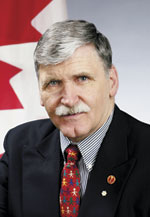 |
|
Senator Roméo Dallaire |
|
Senator Roméo Dallaire, former head of the UN peacekeeping mission in Rwanda, recipient of the United States Legion of Merit and author of award-winning book Shake Hands with the Devil - The Failure of Humanity in Rwanda, has witnessed the failure of humanity to prevent genocide, and does not want humanity to repeat such a mistake – whether through the use of nuclear weapons or other genocidal practices.
PNND, and its partner organizations the Middle Powers Initiative and the Global Security Institute, will also be organizing a number of events at the United Nations between 8-12 Oct, the opening week the United Nations General Assembly Disarmament Committee.
For more information contact alyn@pnnd.org
2. Einstein’s legacy reaffirmed - Pugwash 50th anniversary
 |
|
Hon. Marian Hobbs |
|
Fifty years after nuclear scientists from East and West held a historic meeting in the village of Pugwash to discuss nuclear abolition and international cooperation, a new generation of experts returned to Nova Scotia to discuss ways to achieve that vision. Pugwash, the Nobel Peace-Prize winning organization founded by Albert Einstein and Bertrand Russell, commemorated its 50th anniversary at the Pugwash Thinker’s Lodge with a high-level meeting of former heads of State, parliamentarians, scientists, diplomats and nuclear weapons experts, convened on July 7 with the assistance of the Middle Powers Initiative.
PNND members Senator Roméo Dallaire (Canada) and Hon Marian Hobbs (New Zealand) featured at a public address opening the conference on the topic From Cyrus Eaton to Joseph Rotblat: Creating the Path to a Nuclear Weapons-Free World. Mikhail Gorbachev, former President of the Soviet Union, told the conference by letter that "(We need to) build an intellectual foundation for agreements that would dramatically cut the arsenals of nuclear weapons on their way to their elimination and prevent an arms race in space,"
Major media covered the historic conference , interviewing several prominent leaders within the MPI/PNND network, including Senator Emeritus Douglas Roche, O.C., Former UN Under-Secretary-General Jayantha Dhanapala and Mikhail Gorbachev.
- Pugwash 50th anniversary declaration
The Pugwash 50th anniversary conference adopted a declaration warning world leaders about the increased dangers of nuclear weapons use, and calling for steps to reduce reliance on nuclear weapons and achieve their global elimination through a nuclear weapons convention.
Full declaration of the Pugwash 50th Anniversary Workshop
- European Parliament Vice-President on Pugwash, Disarmament and Peace
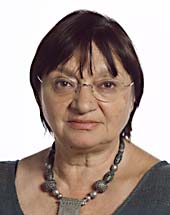 |
|
Luisa Morgantini, MEP |
|
On 12 July, Luisa Morgantini, PNND Member and Vice-President of the European Parliament, circulated a statement to the media and to all Members of the European Parliament, noting the historic Pugwash anniversary and supporting the nuclear disarmament steps in the Pugwash declaration.
In particular Luisa Morgantini highlighted the need for European nuclear weapons sharing countries (Belgium, Germany, Italy, Netherlands and Turkey) to remove nuclear weapons from their territories and support steps leading to the prohibition of nuclear weapons, landmines and uranium weapons and the reallocation of funds from these weapons to socially beneficial enterprises.
Full press statement of Luisa Morgantini.
3. European Parliament written declaration on tactical nuclear weapons in Europe
 |
|
Angelika Beer, MEP |
|
In October 2006, PNND members Caroline Lucas MEP and Angelika Beer MEP initiated a European Parliament written declaration calling for the removal of US nuclear weapons deployed in the territories of European countries and urging “NATO to include this issue as a permanent item on the agendas for its ministerial meetings and summits until such time as the withdrawal has been completed;”
| |
 |
|
Caroline Lucas, MEP |
The declaration and list of endorsing MEPs (Members of the European Parliament) was sent to the European Council, the European Commission and the US Government at the end of 2006.
The action is part of a growing momentum on the removal of tactical weapons from Europe which has seen resolutions adopted in the Belgian parliament and the recent ending of nuclear weapons deployment at airbases in Greece and Germany.
4. United States removes nuclear weapons from German airbase
According to the Natural Resources Defence Council, the US Air Force recently discontinued the deployment of nuclear weapons at the Ramstein airbase in Germany. Documents obtained by Hans Kristensen (Nuclear Surety Staff Assistance Visit (NSSAV) and Functional Expert Visit (FEV) Program Management) indicate that the Ramstein airbase is no longer included one of the European installations that receive periodic nuclear weapons inspections, indicating that nuclear weapons previously stored at the base have likely been removed and withdrawn to the United States.
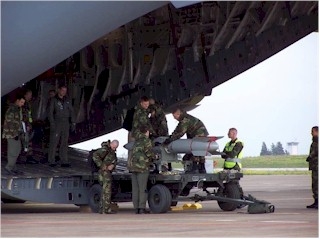 |
|
B61 nuclear bomb being loaded unto a C-17 cargo aircraft
Photo courtesy of Federation of American Scientists |
|
Büchel Air base is the only site in Germany that now stores nuclear weapons. The apparent withdrawal reduces the number of U.S. nuclear weapons deployed in Europe to an estimated 350 B61 bombs, or roughly equivalent to the size of the entire French nuclear weapons inventory. The remaining bombs are stored at seven bases in six NATO countries.
See Documents Indicate United States Removes Nuclear Weapons From German Base, and Model Nuclear Inventory from Reaching Critical Will.
5. Convention on Nuclear Terrorism enters-into-force
On 7 July, the Convention on the Suppression of Acts of Nuclear Terrorism entered into force, 30 days after the receipt of the 22nd instrument of ratification. The Convention requires States Parties to enact criminal laws prohibiting acts of nuclear terrorism or acts that would support nuclear terrorism, and providing for the prosecution or extradition of persons breaking these laws.
In addition, the Convention requires States to cooperate on the suppression of acts of nuclear terrorism through exchange of information and the apprehension (and possible extradition) of individuals suspected of conducting prohibited acts under the convention regardless of where those acts were committed.
The convention faced some problems in negotiation due to the fact that the Nuclear Weapon States reserved a ‘right’ of State actors to threaten or use nuclear weapons while criminalizing this act by non-State actors. Some non-nuclear States argued that the threat or use of nuclear weapons was illegal for everyone, and would not accept any exclusions in the Convention. The compromise reached was a disclaimer that “This Convention does not address, nor can it be interpreted as addressing, in any way, the issue of the legality of the use or threat of use of nuclear weapons by States.” (Article 4.4)
6. Proposal in Israel parliament to close Dimona nuclear reactor
PNND Member Dov Khenin has introduced a draft resolution into the Knesset (Israeli Parliament) calling on the closure of the Dimona nuclear reactor, which supposedly produced fissile material for Israeli nuclear weapons. The proposal mirrors the suggestion by Dr. Hans Blix, Chair of the Commission on Weapons of Mass Destruction, for the closure of all facilities in the Middle East capable of producing fuel for nuclear weapons, i.e. the Dimona reactor in Israel and the uranium centrifuges in Iran. (See WMD Commission head says Israel and Iran 'should both end fuel-cycles, Ynetnews, 24 May 2007).
 |
|
Dov Khenin, MK |
|
Closure of the Dimona facility would not immediately impact on Israel’s nuclear capacity, as the fissile material for their suspected arsenal is already produced. However, it would be seen as a goodwill or confidence-building measure to other Middle East countries that could help the diplomatic process for ending Iran’s uranium enrichment activities, and possibly help prevent the development of nuclear energy in neighbouring Arab countries.
The Blix Commission noted that: “While Israel, feeling under threat from Iran and others, is not likely to discard its nuclear-weapon capability except as part of a peace settlement, it could help to reduce tension, as is now asked of Iran, by joining Iran and all other states in the region in a commitment to suspend and renounce any fuel-cycle activities.”
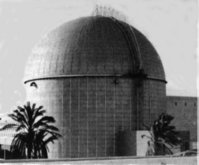 |
|
Dimona nuclear facility in Israel
Photo by Mordechai Vanunu |
|
Without some confidence-building measures there is a very real possibility that some of the Gulf States will embark on nuclear energy programmes. In December, the members of the Gulf Cooperation Council (Bahrain, Kuwait, Oman, Qatar, Saudi Arabia and the United Arab Emirates) announced a plan to explore the possibility of creating a shared peaceful nuclear program. Soon after, Egypt announced that they might resume their currently-mothballed nuclear energy programme.
Recently there have been a number of academic and civil society initiatives bringing together Israelis and Arabs to discuss proposals and prospects for a Nuclear Free Middle East. (See Alexandria Library Seminar on a Nuclear Free Middle East (Alexandria, Egypt) and Promoting peace through dialogue conference (Amman, Jordan).
7. US Congress Non-Proliferation Task Force Hosts Hans Blix
On 3 May 2007, Congressman Ed Markey (D-MA) and Chris Shays (R-CT) hosted a cross-party discussion in the US Congress on “Nuclear Weapons: Resolving Iran, Reviewing Iraq” with Dr. Hans Blix (Chair of the Commission on Weapons of Mass Destruction), Jonathan Granoff, (PNND Council Member and President of Global Security Institute) and Ambassador Thomas Graham, Jr. (Chairman of the Bipartisan Security Group, PNND’s partner organization in the US Congress).
Dr. Blix presented some of the recommendations contained in the report of the WMD Commission, Weapons of Terror: Freeing the World of Nuclear, Biological and Chemical Arms. Mr. Granoff presented the Middle Powers Initiative brief, Towards 2010: Priorities for NPT Consensus, and GSI’s newest Policy Brief, Advancing a Cooperative Security Regime in Outer Space. Ambassador Graham consistently reinforced the argument that fulfilling the non-proliferation and disarmament obligations under the NPT is simultaneously in the interest of both US and international security.
8.Cross-party support grows for Nuclear Weapons Convention
International support for a Nuclear Weapons Convention (NWC) – a global treaty abolishing nuclear weapons – has grown recently with the following:
9. Key UK Policy Statement on Nuclear Abolition
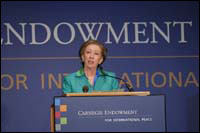 |
|
Foreign Secretary Margarett Beckett |
|
On 25 June, Hon Margaret Beckett, the then-UK Foreign Secretary, delivered a key note speech at the 2007 Carnegie International Nonproliferation Conference, at which she recalled the successful campaign to abolish slavery, invoked the vision of nuclear abolition, and committed the UK to study and develop the technical and political conditions required to achieve complete nuclear disarmament.
- Excerpts from the speech:
“What we need is both vision - a scenario for a world free of nuclear weapons - and action…”
- “When William Wilberforce began his famous campaign, the practice of one set of people enslaving another had existed for thousands of years. He had the courage to challenge that paradigm; and in so doing he helped to bring an end to the terrible evil of the transatlantic slave trade. Would he have achieved half as much, would he have inspired the same fervour in others if he had set out to 'regulate' or 'reduce' the slave trade rather than abolish it? I doubt it.”
- “So too with nuclear weapons. Believing that the eventual abolition of nuclear weapons is possible can act as a spur for action on disarmament. Believing, at whatever level, that it is not, is the surest path to inaction.”
- “When it comes to building this new impetus for global nuclear disarmament, I want the UK to be at the forefront of both the thinking and the practical work. To be, as it were, a ‘disarmament laboratory’. As far as new thinking goes, the International Institute of Strategic Studies is planning an in-depth study to help determine the requirements for the eventual elimination of all nuclear weapons. We will participate in that study and provide funding for one of their workshops, focusing on some of the crucial technical questions in this area.”
10. Japan Defense Minister resignation over nuclear bombing comments
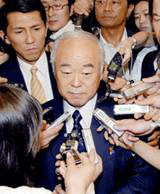 |
|
Defense Minister Fumio Kyuma after his resignation |
|
Japan’s Defense Minister Fumio Kyuma was forced to resign on 3 July after making comments perceived as justifying the US atomic bombings of Japan. In a speech on 30 June, Kyuma, who is from Nagasaki, said: "I understand the bombing (in Nagasaki) brought the war to its end. I think it was something that couldn't be helped."
The remarks prompted mass demonstrations at the Nagasaki Peace Park, which is sited at the epi-centre of the 9 August 1945 nuclear bombing, and criticism from the opposition, leading to his resignation.
Nagasaki Mayor Tomihisa Taue made a face-saving offer to Kyuma following his resignation by saying “Even after his resignation, I would like him to work for the abolishment of nuclear weapons as a Diet (Parliament) member from a prefecture that suffered an atomic bombing,"
See: Kyuma exits over A-bomb gaffe
Kyuma earned ouster: A-bomb survivors
11. Japanese parliament debates US-India deal
 |
|
INUZUKA Tadashi |
|
On 14 June 2007, the Upper House of the Japanese Parliament (Diet) debated the US-India nuclear deal at the instigation of Tadashi Inuzuka, a Democratic Party (opposition) member from Nagasaki and member of the Parliamentary Network for Nuclear Disarmament (PNND).
In the debate, Foreign Minister Taro Aso and officials of the Foreign Ministry acknowledged that they had concerns about the deal, and that they could not accept the deal if it would assist any military programs.
See: Debate on US-India nuclear technology deal
12. Iran
Concern has been growing in the US Congress at the increasing possibility that the Administration might seriously consider the use of force against Iran if diplomatic efforts fail to prevent Iran from enriching sufficient uranium to make a nuclear weapon or weapons. Experts believe that Iran is still some way from developing such a capability. However, the rising tension between the US and Iran, coupled with the disastrous example of preventive use of force against Iraq, is making lawmakers nervous.
Resolutions have thus been introduced into the House and Senate affirming a legal and constitutional requirement on the President to seek congressional approval before any use of force against Iran.
Click here to see the Senate version of the bill
Click here to see the House version of the bill |


